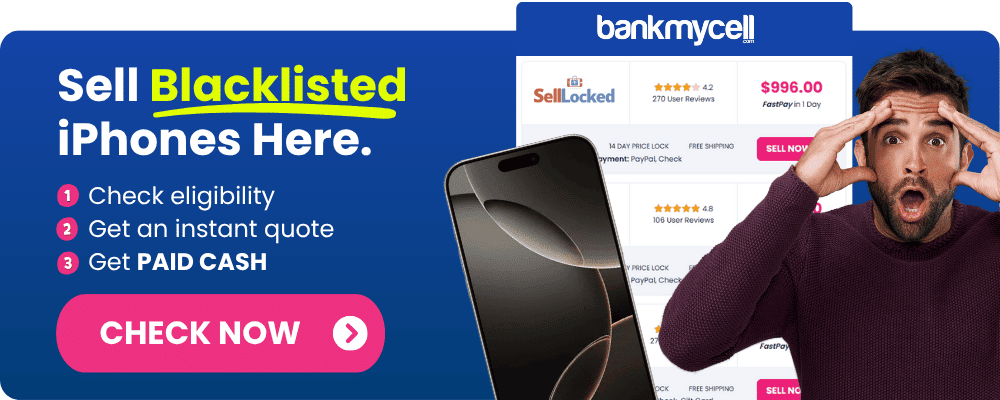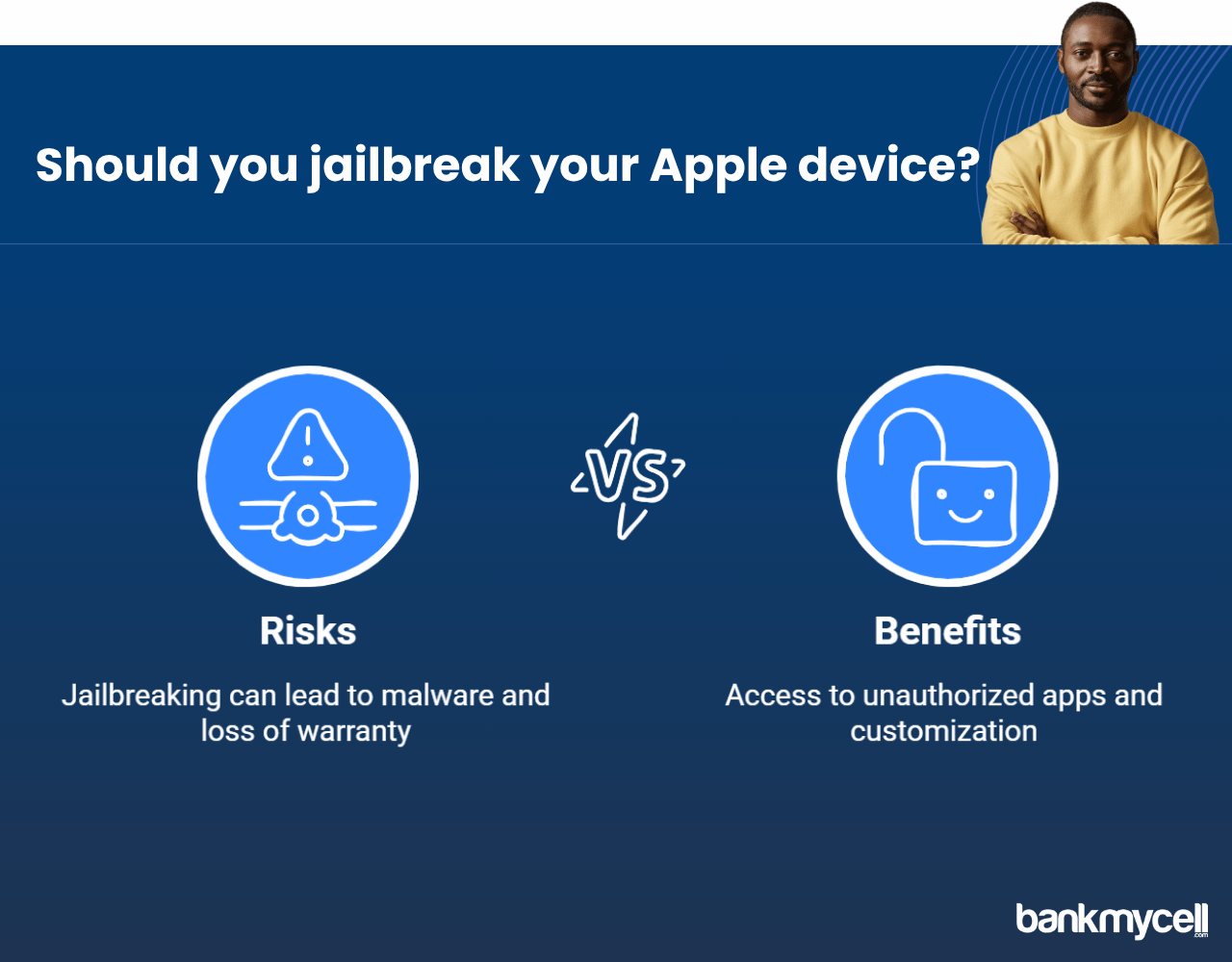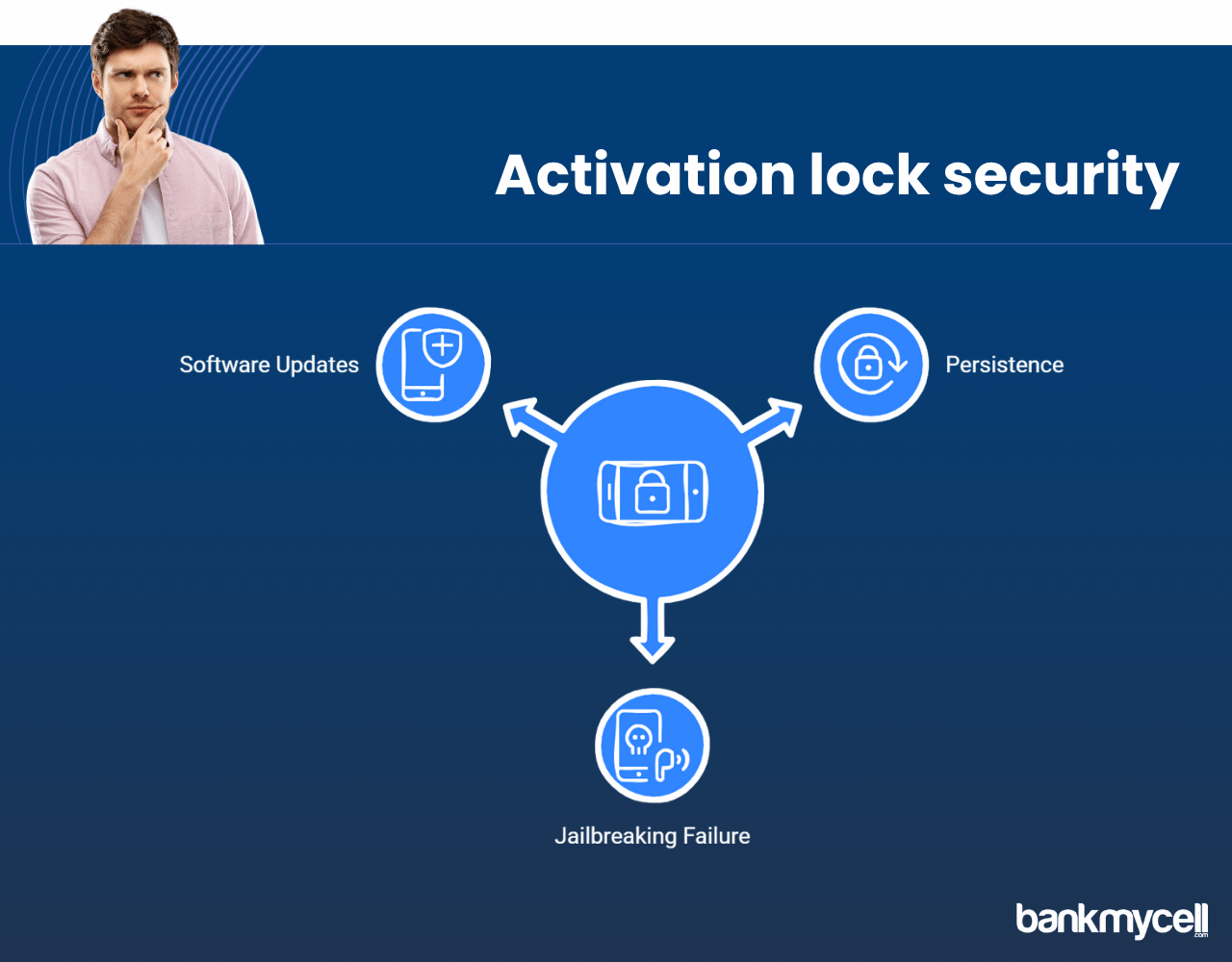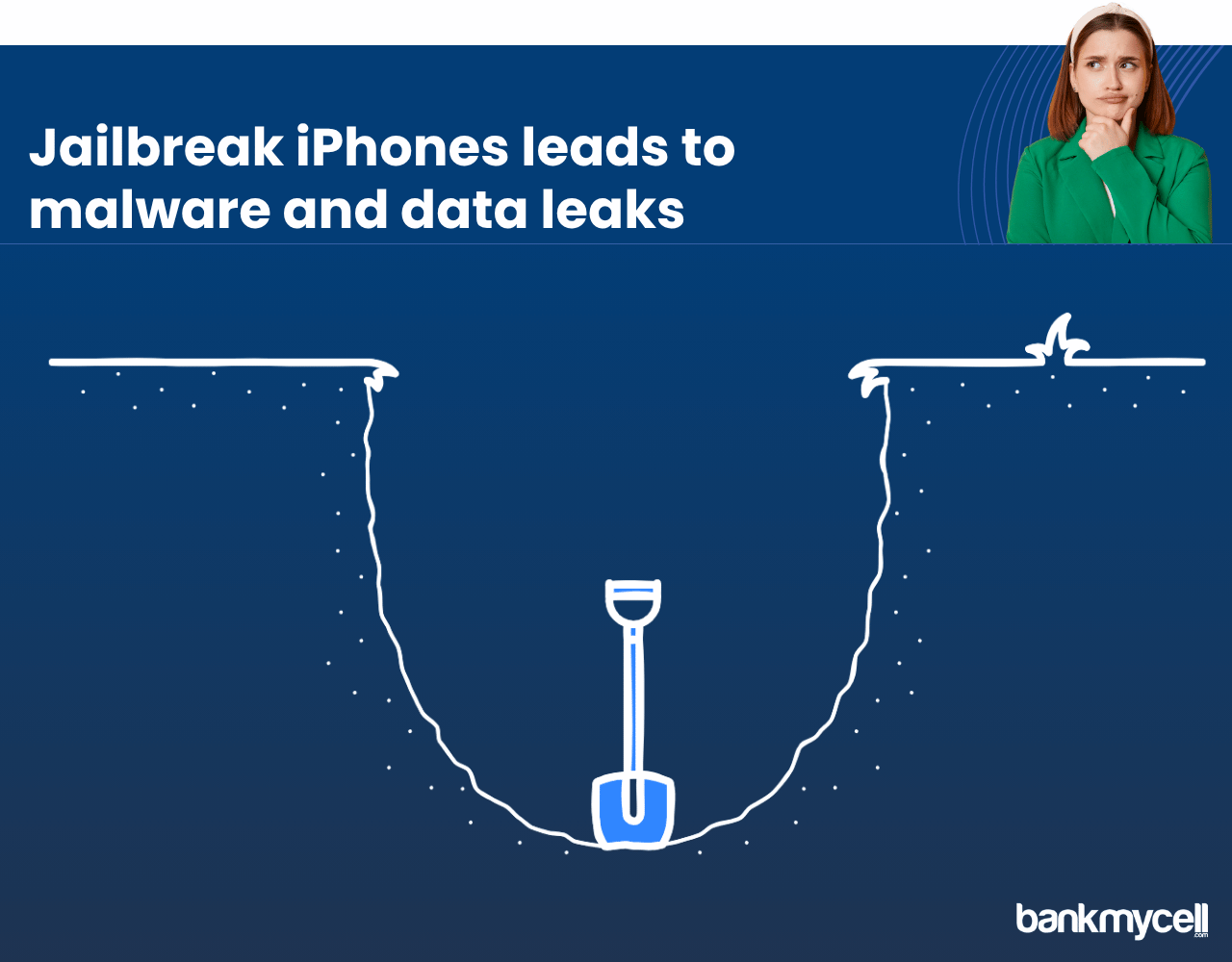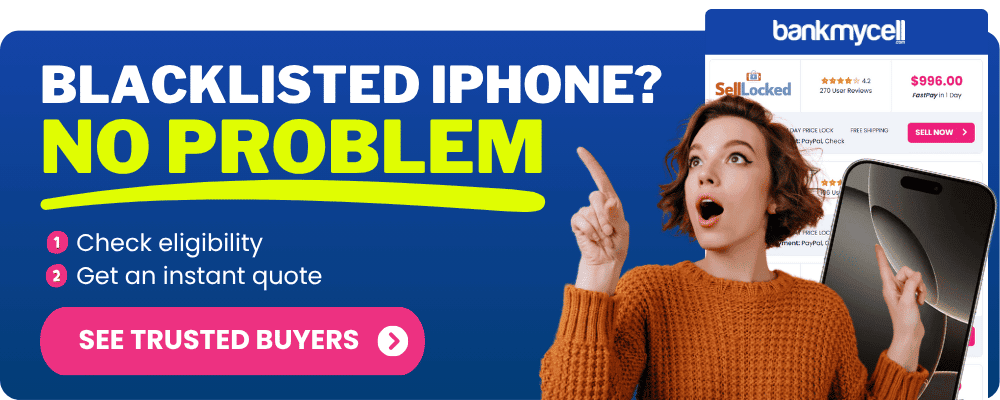Can You Jailbreak a Stolen iPhone? Why It's Unethical and Unhelpful
60-Second Summary
Jailbreaking a stolen iPhone is illegal, unethical, and now impossible. Even if it were possible, stolen phones are usually blacklisted and unusable on any network. Stick to legitimate ways to buy a quality iPhone.
Jailbreaking a Stolen iPhone: Why It’s Impossible (Or a Very Bad Idea)
Here are the issues with that plan:
- Activation Lock security cannot be bypassed. Learn more
- Stolen devices are blacklisted by cellular providers. This means their IMEI numbers are blocked from ever being used on a network again.
- Apple’s iOS updates patch the vulnerabilities jailbreaks need to function. See the latest security features here.
- The only thing it really lets you do is use it like an iPod Touch with Wi-Fi (and many other useful features are grayed out or disabled completely).
Jailbreaking a Stolen iPhone: Legal and Security Problems You’ll Incur
And if you ignore that advice, you also open yourself up to:
- Criminal prosecution for possession of stolen goods. Find out more.
- Arrest and criminal charges for identity theft, if you use any of the data from the stolen device.
- The jailbreaking tools themselves introduce major security vulnerabilities on your devices that put your own data at risk. See more info.
- You also lose any warranty and Apple support for your device, since jailbreaking voids all manufacturer support and updates.
Buy a Legit iPhone Instead: Practical, Workable Alternatives
Plus, instead of getting into trouble, why not:
- Buy a certified refurbished iPhone instead. Many official refurb providers, including Apple, offer warranties and legitimate discounts on out-of-warranty iPhones. See a full comparison of legitimate alternatives.
- Always double-check the IMEI numbers on used or pre-owned iPhones you’re looking to buy, so you know for sure that they’re not blacklisted.
- Look for older iPhone models that retain value well, like the iPhone 12, 11, or SE series, which can also have great battery life even several years in.
- Use carrier trade-in programs to offset the cost of buying an iPhone. Most major providers offer iPhone trade-in programs that can significantly cut the cost of a new device.
- Buy from BankMyCell for the best deals on legitimate phones. We work with trusted buyback stores that only sell fully unlocked, brand new or factory refurbished phones from legit sources. We also compare the top buyback stores to help you find the best iPhone deals, with clear price estimates, full device histories, transparent condition categories, and buyer protections. Get a high-quality iPhone from BankMyCell without any jailbreaking headaches or legal risk.
Modern security updates make the technical side of jailbreaking a stolen iPhone impossible. Avoid the legal and ethical risks and save the hassle by just buying a legit iPhone instead!
Bottom Line: Don’t know which iPhone to buy? Want an affordable iPhone without the hassle or risk? Skip all that and avoid legal problems altogether. BankMyCell is here to help! We compare deals from the top buyback stores for legitimate, brand new and factory refurbished iPhones so you know you’re getting a quality device that’s actually unlocked, functional, legal to use, and with full customer service from a reputable company—no blacklisted IMEI numbers, no jailbreaking, no stolen goods, no problems.
Disclaimer: You can sell blacklisted iPhones as long as you’re the legal owner. For example, if you bought the iPhone from a store or a person and it’s not found or stolen, you can sell it. If you’re unsure, check with the store you choose, and they will guide you.
| TODAY'S BEST iPHONE BUYBACK OFFERS | |||
|---|---|---|---|
| Device | Blacklisted | ||
| iPhone 17 Pro Max | $1360.00 | Compare | |
| iPhone 17 Pro | $970.00 | Compare | |
| iPhone 17 | $630.00 | Compare | |
| iPhone Air | $590.00 | Compare | |
| iPhone 16e | $360.00 | Compare | |
| iPhone 16 Pro Max | $1045.00 | Compare | |
| iPhone 16 Pro | $870.00 | Compare | |
| iPhone 16 Plus | $420.00 | Compare | |
| iPhone 16 | $395.00 | Compare | |
| iPhone 15 Pro Max | $730.00 | Compare | |
| iPhone 15 Pro | $650.00 | Compare | |
| iPhone 15 Plus | $335.00 | Compare | |
| iPhone 15 | $345.00 | Compare | |
| iPhone 14 Pro Max | $570.00 | Compare | |
| iPhone 14 Pro | $400.00 | Compare | |
| iPhone 14 Plus | $265.00 | Compare | |
| iPhone 14 | $235.00 | Compare | |
| iPhone 13 Pro Max | $280.00 | Compare | |
| iPhone 13 Pro | $220.00 | Compare | |
| iPhone 13 Mini | $115.00 | Compare | |
| iPhone 13 | $140.00 | Compare | |
| iPhone 12 Pro Max | $170.00 | Compare | |
| iPhone 12 Pro | $140.00 | Compare | |
| iPhone 12 Mini | $120.00 | Compare | |
| iPhone 12 | $115.00 | Compare | |
| iPhone 11 Pro Max | $130.00 | Compare | |
| iPhone 11 Pro | $170.00 | Compare | |
| iPhone 11 | $105.00 | Compare | |
| * Best market prices updated February 11th 2026 | |||

Data Source: BankMyCell compares over 100,000+ quotes and customer reviews from 20+ trusted buyback stores every 15 minutes via our data feeds, making us America’s #1 time-saving trade-in supermarket.
Have you considered the possibility of jailbreaking a stolen iPhone? Perhaps you’ve come across online claims that Apple’s security systems on stolen devices can be bypassed without needing an Apple ID password.
Online sources provide suspicious methods for “unlocking” or “jailbreaking stolen iPhones” that falsely assure quick fixes to restore device usability. This approach presents significant issues that extend past technical difficulties when it comes to jailbroken iOS devices.
Here’s the problem:
Using jailbreaking to access a stolen iPhone is illegal and unethical while being less effective because of Apple’s latest security measures which include Activation Lock and screen passcode protection.
And that’s not all…
A stolen iPhone will remain unusable because carriers blacklist it and Apple flags it in their system even after jailbreaking, which also introduces multiple security vulnerabilities that degrade performance.
The process of jailbreaking involves removing the software restrictions set by iOS to allow users root-level access to their iPhones.
The process of jailbreaking involves eliminating the software limitations built into iOS which is Apple’s operating system. Root access to the iOS file system enables users to install applications and make modifications that Apple’s official Store does not provide.
This means:
- You are circumventing the protective measures set by Apple for iOS devices.
- Unauthorized apps may introduce malware to your device.
- By jailbreaking your Apple device you invalidate the warranty and Apple customer support services.
Think about it:
By jailbreaking legally owned iPhones users create potential security gaps. By using a jailbreak on stolen devices you create additional security threats to these devices while adding ethical violations.
Users need to understand that jailbreaking modifies system software but unlocking eliminates carrier restrictions. No legitimate method exists for bypassing Activation Lock or screen passcode on stolen devices through these processes.
Need an iPhone that guarantees security and integrity? BankMyCell enables price comparisons among trusted sellers for devices free from ethical issues and security risks.
Why Jailbreaking Stolen iPhones Is Ineffective
The latest iPhones and iPads use multiple security layers which prevent theft from being worthwhile. The advanced security systems now in place have created more obstacles for anyone attempting to use jailbroken iOS devices.
Stolen iPhones become nearly impossible to jailbreak because Activation Lock prevents unauthorized access.
The Activation Lock feature automatically engages when Find My iPhone is turned on and prevents unauthorized use of the iPhone until the legitimate Apple ID and password are entered.
The following explanation demonstrates why jailbreaking fails to unlock an iPhone.
- Activation Lock functions as a hardware security measure across iPhone and iPad devices
- It persists even after factory reset attempts
- Contemporary jailbreaking software fails to circumvent this security measure.
- Every new software update for iOS increases the difficulty of getting around security mechanisms.
Older videos and guides that purport to bypass this protection fail to work on newer iOS versions or devices even when placed in recovery mode.
Blacklisting Remains in Effect for Stolen Phones
Should a person succeed in bypassing Activation Lock (a highly improbable scenario), stolen devices would still encounter a significant barrier as they attempt to operate.
The blacklist problem with a stolen device:
- Stolen iPhones are typically reported to carriers
- The device’s unique IMEI number gets blacklisted
- Blacklisted phones cannot connect to cellular networks
- This restriction persists regardless of jailbreaking attempts
A jailbroken stolen iPhone may connect to Wi-Fi networks but will operate as an expensive iPod Touch which remains an insecure jailbroken phone.
Security Vulnerabilities Are Substantial with Jailbroken Devices
Jailbreaking a stolen iPhone creates serious security threats which endanger all stored data.
- When users install jailbreaking tools from unreliable sources they risk downloading software that contains malware.
- Modified iOS systems lack critical software updates
- User data can remain present on the device after jailbreaking.
- The process of jailbreaking iPhones makes them more susceptible to further hacking attempts.
The act of jailbreaking a stolen iPhone creates severe security risks which compromise data safety regardless of the ethical issues involved.
Using a stolen iPhone involves significant legal repercussions and ethical issues in addition to technical restrictions.
The use of stolen devices presents significant ethical and legal concerns alongside technical challenges.
Ethical Problems with Stolen Apple Devices
While stealing someone else’s property is clearly wrong it creates extra ethical issues when dealing with lost iPhones or stolen phones.
- By using the device you could gain unauthorized access to another person’s private information.
- The original owner faces loss which includes their device alongside potentially one-of-a-kind photos and important information.
- Your actions help build a stolen device market which incentivizes theft.
- You invade someone’s privacy and security measures by removing their phone password.
Legal Consequences of Using Stolen iPhones
Using jailbroken stolen iPhones presents serious legal challenges since it can lead to copyright law violations.
- The act of possessing stolen property amounts to a criminal infraction
- Accessing identity or payment information on the stolen device is considered identity theft.
- Security measure circumvention may lead to violations of computer crime laws.
- Service theft charges can be filed by carriers against individuals who use stolen devices.
Legal repercussions for launching iTunes with stolen devices range from monetary penalties to imprisonment depending on location and specific conditions.
Need a new iPhone without the risks? BankMyCell.com enables users to compare offers from reliable buyback stores to find both economical and ethically-sound devices.
Legitimate Alternatives to Using Stolen iPhones
There exist numerous legitimate methods to unlock an iPhone while staying within budget constraints.
Buy Refurbished or Used (Legitimately)
- Source your iPhones from authorized refurbishment programs or legitimate second-hand sellers.
- Verify that devices have been unlocked completely and retain functioning Touch ID and Face ID features.
- Check that the IMEI number is legitimate (not blacklisted).
- Maintaining your iPhone’s security requires you to obtain purchase documentation and receipts.
Disclaimer: You can sell blacklisted iPhones as long as you’re the legal owner. For example, if you bought the iPhone from a store or a person and it’s not found or stolen, you can sell it. If you’re unsure, check with the store you choose, and they will guide you.
Consider Older Models with Good Battery Life
- Previous generation iPhones are much more affordable
- They still receive security updates for years
- They run most third-party apps without issues
- You can find earlier iPhone models through trusted outlets where their batteries last longer.
Explore Budget-Friendly Alternatives on the Home Screen
- Look into trade-in programs to reduce costs
- Consider payment plans from reputable retailers
- Examine carrier promotions on new phone activations for fresh activations.
- Examine certified pre-owned programs that provide warranties while preserving other essential features.
Wrapping It Up
Can you jailbreak a stolen iPhone? The process of jailbreaking a stolen iPhone grows more challenging technically but it ultimately becomes futile because it violates ethical standards and legal laws and fails technically. Apple developed its security systems to stop theft which makes bypassing them more challenging and dangerous.
By pursuing legitimate alternatives, you can:
- Stay clear of legal and ethical violations when using stolen devices
- Seek devices that perform flawlessly without the limitations imposed by lost mode.
- Protect your personal information from security vulnerabilities
- You can help shrink the stolen iPhone trade by choosing legitimate options.
If a deal appears excessively attractive, it likely has hidden risks. The savings from using a stolen iPhone do not justify the potential legal and security risks.
Disclaimer: You can sell blacklisted iPhones as long as you’re the legal owner. For example, if you bought the iPhone from a store or a person and it’s not found or stolen, you can sell it. If you’re unsure, check with the store you choose, and they will guide you.
Helpful FAQ's
Can Apple track a stolen iPhone even after jailbreaking?
Apple maintains the capability to track a stolen iPhone even after jailbreaking efforts have been made.
Apple maintains tracking capabilities for stolen iPhones through database records even after users attempt to jailbreak the devices. Activation Lock stays active through reset attempts and even after jailbreaking when connected via USB cable because Apple keeps the device’s serial number and IMEI information in their stolen device registry.
Can factory reset remove Activation Lock?
A factory reset does not eliminate Activation Lock from a stolen iPhone.
No, factory resetting won’t remove Activation Lock. Activation Lock stays intact through factory resets because it connects to the original owner’s Apple ID. The security feature serves to both prevent theft of devices and protect against data loss.
How can I verify an iPhone isn't stolen before buying?
Before purchasing an iPhone, you should verify its status using the IMEI number through services that identify stolen or blacklisted devices.
Always utilize services that check IMEI numbers to determine if a device is stolen or blacklisted before purchase. Request that the seller demonstrate the device is free of Apple ID locks and Find My iPhone activation to protect your data usage.
What should I do if I unknowingly bought a stolen iPhone?
You need to report the stolen iPhone to local police without using the device and retain your purchase receipts to prove your innocence.
Immediately report the stolen iPhone to your local police department if you find out you bought it unknowingly. Avoid jailbreaking or operating the device since those actions could make you appear guilty of theft. Maintain possession of your purchase receipts or documentation to demonstrate your good faith acquisition while steering clear of deceptive phishing schemes offering assistance.
Is jailbreaking ever legal?
Some people jailbreak their iPhones for valid purposes like adding custom features or accessing non-App Store applications.
People who own their iPhones can jailbreak their devices for legitimate purposes including installing customizations and removing carrier restrictions as well as accessing applications not available in the App Store. You should only jailbreak devices you legally own while understanding the security risks associated with jailbroken iOS devices.
